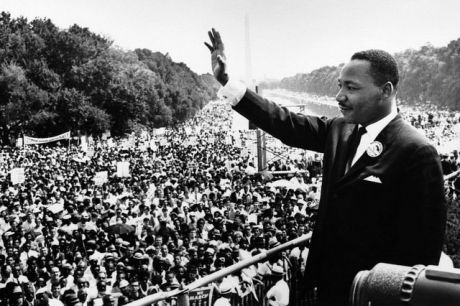Features
You are here
Fifty years after Martin Luther King’s dream

September 28, 2013
In August 1963, in a speech that has gone down as a watershed moment in history, Martin Luther King stood in front of the Washington Monument and condemned the American racial apartheid system. The 1963 speech has become a central part of King’s myth—a myth safe enough for mainstream American history to promote and, indeed, safe enough for a day to be named in his honour. This myth teaches us King was a preacher who just wanted people to be better and the world more peaceful. The real King was far more intelligent and complex and rather more radical.
King was not after better people or merely asking for racial acceptance. He was demanding a better, more just, society for all. King was not alone. The American civil rights movement was part of a larger anti-colonial struggle that saw black and brown peoples fight to end European colonialism in Africa and Asia.
King after 1963
After the speech, as violence against the civil rights movement escalated—including the sickening murder of four little girls in Birmingham, Alabama—King and other black leaders began to fall in line with grassroots anger. King went from troublesome priest to subversive by publicly attacking the immorality of the violence being unleashed by Washington’s war machine in Vietnam. King decried the military’s criminal waste of money when millions of Americans lived in poverty.
While never a Marxist, King had evolved politically and came to the revolutionary realization that the whole American capitalist/imperialist system was rotten to its core. Racism, war, crime, violence, poverty and inequality were created and maintained by a vast inter-locked system that most barely saw, let alone understood.
In 1968, King went further and organized the "Poor People's Campaign" to demand economic justice. The campaign intended to take a “multiracial army of the poor" to Washington to demand an “economic bill of rights” for the poor. King was becoming dangerous—class and inequality were things the American indoctrination system pretended did not exist.
In late March 1968, King came to Memphis to support black sanitation workers striking against low pay and discrimination. The city was using the old tactic of turning white workers against blacks by paying black workers less. On April 3, 1968, the day before his assassination, King gave his “I’ve been to the mountaintop” speech—his last and perhaps most heartfelt. More than any other, this speech reveals King’s fundamental beliefs. Socialist or not, King was his brother’s keeper and demanded we all be.
Fifty years later
Fifty years after his 1963 speech, what would King make of his country if he were allowed to wander freely? If King thought inequality was bad in 1963, today’s era of multinationals and billionaires would be beyond his belief. The poor may have more gadgets in 2013 but the relative poverty is far worse than 1963.
In 2013, King would find a culture claiming to be anti-racist or post-racial, with a black president symbolizing the gains of the civil rights movement. But King would be wise enough to know that a black candidate owned by the usual corporate, financial and military elites is as capable of doing their bidding as anyone else. King wouldn’t have to look too hard to find a disproportionate number of blacks still facing a grinding daily struggle. As the wealth gap has grown in general in the last few decades, the race gap has grown even more. Due to poverty, blacks suffer more stress, have more health problems and die sooner. This is what poverty does—it is an assault on body and spirit. King would be on depressingly familiar territory.
King would find that alongside a greatly enhanced military-industrial complex, in 2013 there is a vast prison-industrial complex holding about 2.25 million Americans, of which almost one million are black men. No other country comes close to such a nightmare. Half a century after the Jim Crow lynchings of his time, King would find the extra-judicial killing of Trayvon Martin, hunted and killed for being black. No stranger to being tracked by the FBI, King would find a fully developed surveillance state in 2013, with technology able to monitor citizens’ speech, travel, reading and personal communications.
But King would also be pleased to find a familiar and ongoing legacy of struggle—from the millions of Americans who were radicalized against the war on Iraq and those who reject an attack on Syria, to the wave of fast food workers, predominantly from racialized communities, fighting for economic justice.
Section:










